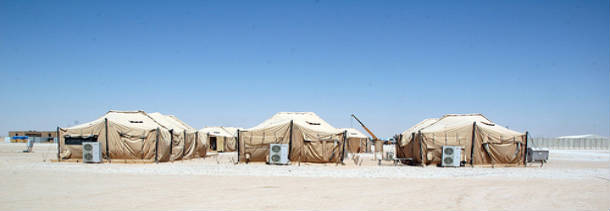
In August 2004, as the insurgency in Iraq gathered force and kidnappings and grisly killings became commonplace, a group of 12 Nepalese contractors were captured by Sunni militants on the road to an American base. Days later, insurgent cameras rolled while they were executed. The men had been employees of Daoud & Partners, a Jordanian subcontractor of Kellog Brown & Root, which specialized in funneling cheap Third World labor to Iraq to staff support positions at US bases.
On Wednesday, the contractors’ families filed racketeering charges against Daoud and KBR in federal court, alleging that the men were drawn to Jordan under false pretenses, had their passports confiscated, and were then sent to Iraq, where 12 died. A thirteenth, one of the plaintiffs in the suit, survived the attack, as he was riding in a different vehicle at the time.
More on the suit from the Courthouse News Service:
The families say the two named defendants – Daoud & Partners and Kellogg Brown & Root – engaged in human trafficking, preying on the men’s poverty by claiming to offer well-paying, safe jobs while charging them a Nepali fortune in brokerage fees. Daoud allegedly charged each man between $1,000 and $3,500, with interest of up to 36 percent, to set him up with a job. That’s between one year and one decade’s wages for the average worker in Nepal.
Plaintiffs say the contractors told the men they would work at the swank Le Royal Hotel in Amman, Jordan, or at an “American camp,” a place the families say they assumed was in the United States. But the men soon found themselves on their way to a war zone. Only one of the 13 young men returned alive, the families say.
According to the complaint, co-conspirator Moonlight Consultant recruited the laborers in Nepal, and filed documents with the Nepali government claiming that the men would work at Jordan’s Le Royal Hotel. Instead, plaintiffs say, Moonlight transferred the men to Jordanian company Morning Star, which temporarily housed the men in Jordan. Plaintiffs say Morning Star has a booming business exporting laborers to Iraq. Another Jordanian company, Bisharat & Partners, transported the men from Jordan to Iraq.
KBR has so far declined comment on the case, other than to say that it does not abide human trafficking. As a spokesman explained in a written statement to the Washington Post: “KBR has not seen the lawsuit so it is premature for us to comment at this time. The safety and security of all employees and those the company serves remains KBR’s top priority. The company in no way condones or tolerates unethical or illegal behavior.”
Photo used under a Creative Commons license from James Gordon.















